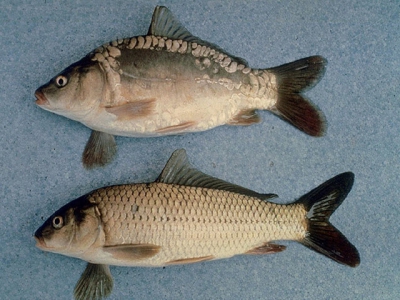Spring Viraemia of Carp

What Is It?
Spring viraemia of carp (SVC) is an infectious viral disease of carp (Cyprinus carpio) and other cyprinid fish species. The common carp is the principal host, but clinical disease has also been reported to occur in koi carp, grass carp, silver carp, crucian carp, goldfish, tench and sheatfish.
Where and When Might it Occur?
SVC was initially diagnosed in Yugoslavia (Fijan et al. 1971). Since then, it has been identified in other European countries, Russia, Brazil, the Middle East, China, and North America.
SVC is mainly present in countries which experience low water temperatures.
The virus is often transmitted by the virus remaining in the feces of infected fish and from blood-sucking parasites.
High mortality can occur in all age groups of fish at water temperatures between 10 and 17C, especially in spring. However, fry can be affected at temperatures as high as 23C.
Diagnosis
SVC virus multiplies in endothelial cells in blood capillaries, haematopoietic tissue and cells of the nephron. Clinical characteristics of affected fish are impairment to the salt water balance, which occurs in association with oedema and haemorrhage.
The causative agent of SVC is a rhabdovirus. It can be isolated in cell culture and identification is achieved by ELISA, immunofluorescence and virus neutralisation test.
Control
The virus can be spread by water and by movement of live infected fish. Controls are based on prevention of movement of fish and equipment from infected farms to uninfected locations, and by appropriate hygiene measures.
SVC has been designated a notifiable disease by the Office International des Epizooties (OIE). The disease is also notifiable under UK legislation and is a List III disease under European Directive 91/67/EEC.
Fish which survive outbreaks of SVC can develop strong protective immunity against the disease. Currently there are no licensed vaccines against SVC.
Source: Fisheries Research Services
Có thể bạn quan tâm
 Salmon scientists collaborate on new global health initiative QASH
Salmon scientists collaborate on new global health initiative QASH Karin Pittman introduces collaborative effort at animal health symposium in Canada
 A slice of genius
A slice of genius A Brazilian aquaculture technology firm has unveiled an innovative production system for farming tilapia - in Brazil and beyond.
 White Spot Disease
White Spot Disease White spot is a contagious parasitic disease of fish. Caused by Ichyophthirius multifilis, the parasite infects the fish after moving from the bottom of the pon